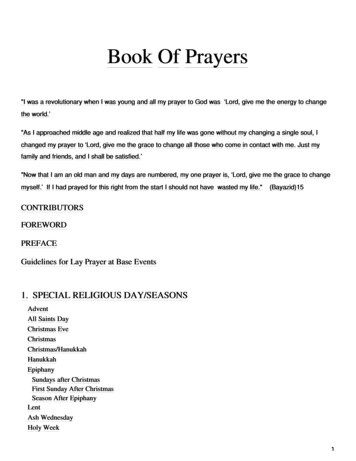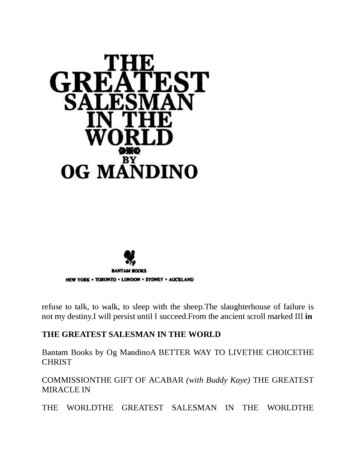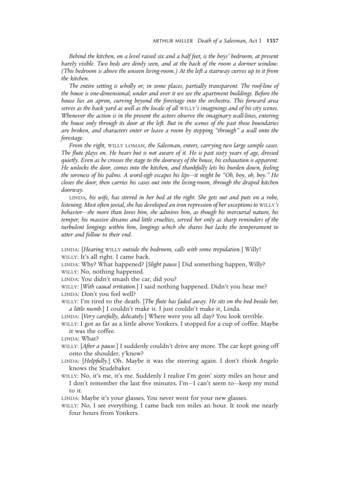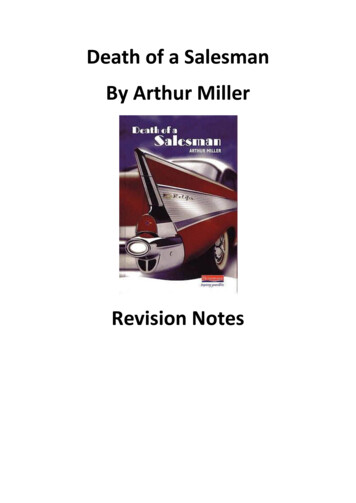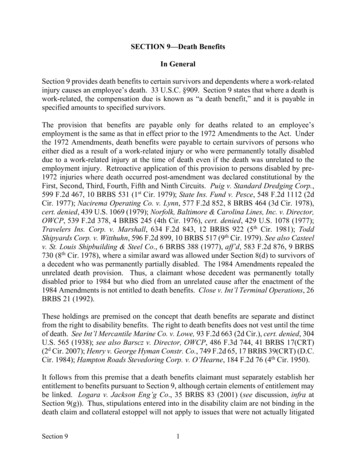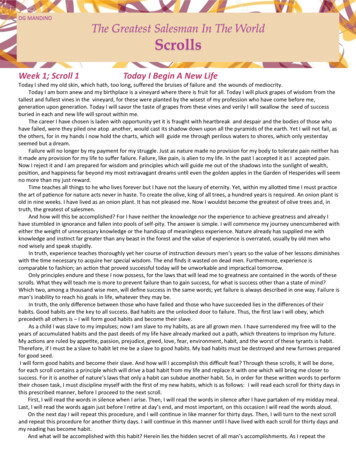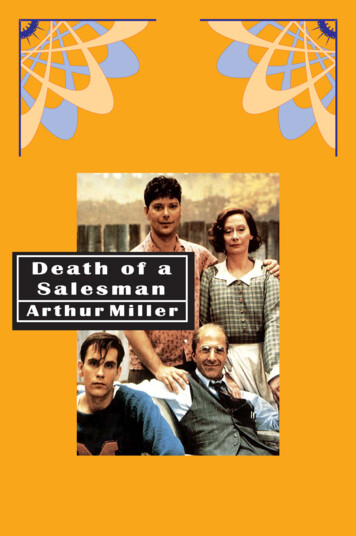
Transcription
Death of aSalesmanArthur Miller
INTRODUCTIONArthur Miller has emerged as one of the most successful andenduring playwrights of the postwar era in America, no doubtbecause his focusing on middle-class anxieties brought on by asociety that emphasizes the hollow values of material success hasstruck such a responsive chord. The recurring theme of anxietyand insecurity reflects much of Arthur Miller’s own past. Born theson of a well-to-do Jewish manufacturer in New York City in 1915,Miller had to experience the social disintegration of his familywhen his father’s business failed during the Great Depression ofthe 1930s. By taking on such odd jobs as waiter, truck driver, andfactory worker, Miller was able to complete his studies at the University of Michigan in 1938. These formative years gave Miller thechance to come in close contact with those who suffered the mostfrom the Depression and instilled in him a strong sense of personal achievement necessary to rise above the situation. He beganwriting plays in the 1930s, but it wasn’t until Death of a Salesmanwas performed in 1949 that Miller established himself as a majorAmerican dramatist.Winning the Pulitzer Prize in 1949, Death of a Salesman has tothis day remained a classic. The play’s intellectual appeal lies inMiller’s refusal to portray his characters as two-dimensional — hisrefusal to involve himself in a one-sided polemic attack on capitalism. Even critics cannot agree as to whether Death of a Salesmanis to be categorized as social criticism, a tragedy, or simply a psychological study. Of necessity, each person will have to draw his orher own individual conclusions.The fact that performances of Death of a Salesman have metwith acclaim throughout the world testifies to its universality: theplay’s conflicts and themes appear not to be uniquely American.
THE CHARACTERSWILLY LOMANLINDABIFFHAPPYBERNARDTHE WOMANCHARLEYUNCLE BENHOWARD WAGNERJENNYSTANLEYMISS FORSYTHELETTAThe action takes place in Willy Loman’s house and yard and invarious places he visits in the New York and Boston of today.New York premiere February 10, 1949.
ACT ONEA melody is heard, played upon a flute. It is small and fine, telling of grass and trees and the horizon. The curtain rises.Before us is the Salesman’s house. We are aware of towering,angular shapes behind it, surrounding it on all sides. Only theblue light of the sky falls upon the house and forestage; the surrounding area shows an angry glow of orange. As more light appears, we see a solid vault of apartment houses around the small,fragile-seeming home. An air of the dream dings to the place, adream rising out of reality. The kitchen at center seems actualenough, for there is a kitchen table with three chairs, and a refrigerator. But no other fixtures are seen. At the back of the kitchenthere is a draped entrance, which leads to the living room. To theright of the kitchen, on a level raised two feet, is a bedroom furnished only with a brass bedstead and a straight chair. On a shelfover the bed a silver athletic trophy stands. A window opens ontothe apartment house at the side.Behind the kitchen, on a level raised six and a half feet, is theboys’ bedroom, at present barely visible. Two beds are dimly seen,and at the back of the room a dormer window. (This bedroom isabove the unseen living room.) At the left a stairway curves up to itfrom the kitchen.The entire setting is wholly or, in some places, partially transparent. The roof-line of the house is one-dimensional; under andover it we see the apartment buildings. Before the house lies anapron, curving beyond the forestage into the orchestra. This forward area serves as the back yard as well as the locale of all Willy’simaginings and of his city scenes. Whenever the action is in thepresent the actors observe the imaginary wall-lines, entering thehouse only through its door at the left. But in the scenes of the pastthese boundaries are broken, and characters enter or leave a roomby stepping »through« a wall onto the forestage.From the right, Willy Loman, the Salesman, enters, carryingtwo large sample cases. The flute plays on. He hears but is notaware of it. He is past sixty years of age, dressed quietly. Even ashe crosses the stage to the doorway of the house, his exhaustion isapparent. He unlocks the door, comes into the kitchen, and thankfully lets his burden down, feeling the soreness of his palms. Aword-sigh escapes his lips — it might be »Oh, boy, oh, boy.« He
closes the door, then carries his cases out into the living room,through the draped kitchen doorway.Linda, his wife, has stirred in her bed at the right. She gets outand puts on a robe, listening. Most often jovial, she has developedan iron repression of her exceptions to Willy’s behavior — she morethan loves him, she admires him, as though his mercurial nature,his temper, his massive dreams and little cruelties, served her onlyas sharp reminders of the turbulent longings within him, longingswhich she shares but lacks the temperament to utter and follow totheir end.LINDA (hearing Willy outside the bedroom, calls with sometrepidation): Willy!WILLY: It’s all right. I came back.LINDA: Why? What happened? (Slight pause.) Did somethinghappen, Willy?WILLY: No, nothing happened.LINDA: You didn’t smash the car, did you?WILLY (with casual irritation): I said nothing happened. Didn’tyou hear me?LINDA: Don’t you feel well?WILLY: I’m tired to the death. (The flute has faded away. He sitson the bed beside her, a little numb.) I couldn’t make it. I justcouldn’t make it, Linda.LINDA (very carefully, delicately): Where were you all day? Youlook terrible.WILLY: I got as far as a little above Yonkers. I stopped for a cupof coffee. Maybe it was the coffee.LINDA: What?WILLY (after a pause): I suddenly couldn’t drive any more. Thecar kept going off onto the shoulder, y’know?LINDA (helpfully): Oh. Maybe it was the steering again. I don’tthink Angelo knows the Studebaker.WILLY: No, it’s me, it’s me. Suddenly I realize I’m goin’ sixtymiles an hour and I don’t remember the last five minutes. I’m— I can’t seem to — keep my mind to it.LINDA: Maybe it’s your glasses. You never went for your newglasses.
WILLY: No, I see everything. I came back ten miles an hour. Ittook me nearly four hours from Yonkers.LINDA (resigned): Well, you’ll just have to take a rest, Willy, youcan’t continue this way.WILLY: I just got back from Florida.LINDA: But you didn’t rest your mind. Your mind is overactive,and the mind is what counts, dear.WILLY: I’ll start out in the morning. Maybe I’ll feel better in themorning. (She is taking off his shoes.) These goddam arch supports are killing me.LINDA: Take an aspirin. Should I get you an aspirin? It’ll sootheyou.WILLY (with wonder): I was driving along, you understand? And Iwas fine. I was even observing the scenery. You can imagine,me looking at scenery, on the road every week of my life. Butit’s so beautiful up there, Linda, the trees are so thick, and thesun is warm. I opened the windshield and just let the warm airbathe over me. And then all of a sudden I’m goin’ off the road!I’m tellin’ya, I absolutely forgot I was driving. If I’d’ve gonethe other way over the white line I might’ve killed somebody.So I went on again — and five minutes later I’m dreamin’again, and I nearly. (He presses two fingers against his eyes.) Ihave such thoughts, I have such strange thoughts.LINDA: Willy, dear. Talk to them again. There’s no reason whyyou can’t work in New York.WILLY: They don’t need me in New York. I’m the New Englandman. I’m vital in New England.LINDA: But you’re sixty years old. They can’t expect you to keeptravelling every week.WILLY: I’ll have to send a wire to Portland. I’m supposed to seeBrown and Morrison tomorrow morning at ten o’clock to showthe line. Goddammit, I could sell them! (He starts putting onhis jacket.)LINDA (taking the jacket from him): Why don’t you go down tothe place tomorrow and tell Howard you’ve simply got to workin New York? You’re too accommodating, dear.WILLY: If old man Wagner was alive I’d a been in charge of NewYork now! That man was a prince, he was a masterful man.
But that boy of his, that Howard, he don’t appreciate. When Iwent north the first time, the Wagner Company didn’t knowwhere New England was!LINDA: Why don’t you tell those things to Howard, dear?WILLY (encouraged): I will, I definitely will. Is there any cheese?LINDA: I’ll make you a sandwich.WILLY: No, go to sleep. I’ll take some milk. I’ll be up right away.The boys in?LINDA: They’re sleeping. Happy took Biff on a date tonight.WILLY (interested): That so?LINDA: It was so nice to see them shaving together, one behindthe other, in the bathroom. And going out together. You notice? The whole house smells of shaving lotion.WILLY: Figure it out. Work a lifetime to pay off a house. Youfinally own it, and there’s nobody to live in it.LINDA: Well, dear, life is a casting off. It’s always that way.WILLY: No, no, some people- some people accomplish something.Did Biff say anything after I went this morning?LINDA: You shouldn’t have criticised him, Willy, especially afterhe just got off the train. You mustn’t lose your temper withhim.WILLY: When the hell did I lose my temper? I simply asked him ifhe was making any money. Is that a criticism?LINDA: But, dear, how could he make any money?WILLY (worried and angered): There’s such an undercurrent inhim. He became a moody man. Did he apologize when I left thismorning?LINDA: He was crestfallen, Willy. You know how he admires you.I think if he finds himself, then you’ll both be happier and notfight any more.WILLY: How can he find himself on a farm? Is that a life? A farmhand? In the beginning, when he was young, I thought, well, ayoung man, it’s good for him to tramp around, take a lot of different jobs. But it’s more than ten years now and he has yet tomake thirty-five dollars a week!LINDA: He’s finding himself, Willy.WILLY: Not finding yourself at the age of thirty-four is a disgrace!
LINDA: Shh!WILLY: The trouble is he’s lazy, goddammit!LINDA: Willy, please!WILLY: Biff is a lazy bum!LINDA: They’re sleeping. Get something to eat. Go on down.WILLY: Why did he come home? I would like to know whatbrought him home.LINDA: I don’t know. I think he’s still lost, Willy. I think he’svery lost.WILLY: Biff Loman is lost. In the greatest country in the world ayoung man with such — personal attractiveness, gets lost. Andsuch a hard worker. There’s one thing about Biff — he’s notlazy.LINDA: Never.WILLY (with pity and resolve): I’ll see him in the morning; I’llhave a nice talk with him. I’ll get him a job selling. He could bebig in no time. My God! Remember how they used to followhim around in high school? When he smiled at one of themtheir faces lit up. When he walked down the street. (He loseshimself in reminiscences.)LINDA (trying to bring him out of it): Willy, dear, I got a new kindof American-type cheese today. It’s whipped.WILLY: Why do you get American when I like Swiss?LINDA: I just thought you’d like a change.WILLY: I don’t want a change! I want Swiss cheese. Why am Ialways being contradicted?LINDA (with a covering laugh): I thought it would be a surprise.WILLY: Why don’t you open a window in here, for God’s sake?LINDA (with infinite patience): They’re all open, dear.WILLY: The way they boxed us in here. Bricks and windows, windows and bricks.LINDA: We should’ve bought the land next door.WILLY: The street is lined with cars. There’s not a breath of freshair in the neighborhood. The grass don’t grow any more, youcan’t raise a carrot in the back yard. They should’ve had a lawagainst apartment houses. Remember those two beautiful elm
trees out there? When I and Biff hung the swing betweenthem?LINDA: Yeah, like being a million miles from the city.WILLY: They should’ve arrested the builder for cutting thosedown. They massacred the neighbourhood. (Lost.) More andmore I think of those days, Linda. This time of year it was lilacand wisteria. And then the peonies would come out, and thedaffodils. What fragrance in this room!LINDA: Well, after all, people had to move somewhere.WILLY: No, there’s more people now.LINDA: I don’t think there’s more people. I thinkWILLY: There’s more people! That’s what’s ruining this country!Population is getting out of control. The competition is maddening! Smell the stink from that apartment house! And another one on the other side. How can they whip cheese?(On Willy’s last line, Biff and Happy raise themselves up intheir beds, listening.)LINDA: Go down, try it. And be quiet.WILLY (turning to Linda, guiltily): You’re not worried about me,are you, sweetheart?BIFF: What’s the matter?HAPPY: Listen!LINDA: You’ve got too much on the ball to worry about.WILLY: You’re my foundation and my support, Linda.LINDA: Just try to relax, dear. You make mountains out of molehills.WILLY: I won’t fight with him any more. If he wants to go back toTexas, let him go.LINDA: He’ll find his way.WILLY: Sure. Certain men just don’t get started till later in life.Like Thomas Edison; I think. Or B. F. Goodrich. One of themwas deaf. (He starts for the bedroom doorway.) I’ll put mymoney on Biff.LINDA: And Willy — if it’s warm Sunday we’ll drive in the country. And we’ll open the windshield, and take lunch.WILLY: No, the windshields don’t open on the new cars.
LINDA: But you opened it today.WILLY: Me? I didn’t. (He stops.) Now isn’t that peculiar! Isn’tthat a remarkable. (He breaks off in amazement and fright asthe flute is heard distantly.)LINDA: What, darling?WILLY: That is the most remarkable thing.LINDA: What, dear?WILLY: I was thinking of the Chevvy. (Slight pause.) Nineteentwenty-eight . when I had that red Chevvy. (Breaks off.) Thatfunny? I coulda sworn I was driving that Chevvy today.LINDA: Well, that’s nothing. Something must’ve reminded you.WILLY: Remarkable. Ts. Remember those days? The way Biffused to simonize that car? The dealer refused to believe therewas eighty thousand miles on it. (He shakes his head.) Heh! (ToLinda.) Close your eyes, I’ll be right up. (He walks out of thebedroom.)HAPPY (to Biff): Jesus, maybe he smashed up the car again!LINDA (calling after Willy): Be careful on the stairs, dear! Thecheese is on the middle shelf. (She turns, goes over to the bed,takes his jacket, and goes out of the bedroom.)(Light has risen on the boys’ room. Unseen, Willy is heard talking to himself, »eighty thousand miles,« and a little laugh. Biffgets out of bed, comes downstage a bit, and stands attentively. Biffis two years older than his brother Happy, well built, but in thesedays bears a worn air and seems less self-assured. He has succeeded less, and his dreams are stronger and less acceptable thanHappy’s. Happy is tall, powerfully made. Sexuality is like a visiblecolor on him, or a scent that many women have discovered. He, likehis brother, is lost, but in a different way, for he has never allowedhimself to turn his face toward defeat and is thus more confusedand hard-skinned, although seemingly more content.)HAPPY (getting out of bed): He’s going to get his license takenaway if he keeps that up. I’m getting nervous about him,y’know, Biff?BIFF: His eyes are going.HAPPY: I’ve driven with him. He sees all right. He just doesn’tkeep his mind on it. I drove into the city with him last week.
He stops at a green light and then it turns red and he goes. (Helaughs.)BIFF: Maybe he’s color-blind.HAPPY: Pop? Why he’s got the finest eye for color in the business. You know that.BIFF (sitting down on his bed): I’m going to sleep.HAPPY: You’re not still sour on Dad, are you, Biff?BIFF: He’s all right, I guess.WILLY (underneath them, in the living room): Yes, sir, eightythousand miles — eighty-two thousand!BIFF: You smoking?HAPPY (holding out a pack of cigarettes): Want one?BIFF: (taking a cigarette): I can never sleep when I smell it.WILLY: What a simonizing job, heh?HAPPY (with deep sentiment): Funny, Biff, y’know? Us sleeping inhere again? The old beds. (He pats his bed affectionately.) Allthe talk that went across those two beds, huh? Our whole lives.BIFF: Yeah. Lotta dreams and plans.HAPPY (with a deep and masculine laugh): About five hundredwomen would like to know what was said in this room. (Theyshare a soft laugh.)BIFF: Remember that big Betsy something — what the hell washer name — over on Bushwick Avenue?HAPPY (combing his hair): With the collie dog!BIFF: That’s the one. I got you in there, remember? HAPPY:Yeah, that was my first time — I think. Boy, there was a pig.(They laugh, almost crudely.) You taught me everything I knowabout women. Don’t forget that.BIFF: I bet you forgot how bashful you used to be. Especially withgirls.HAPPY: Oh, I still am, Biff.BIFF: Oh, go on.HAPPY: I just control it, that’s all. I think I got less bashful andyou got more so. What happened, Biff? Where’s the old humor,the old confidence? (He shakes Biffs knee. Biff gets up andmoves restlessly about the room.) What’s the matter?
BIFF: Why does Dad mock me all the time?HAPPY: He’s not mocking you, he.BIFF: Everything I say there’s a twist of mockery on his face. Ican’t get near him.HAPPY: He just wants you to make good, that’s all. I wanted totalk to you about Dad for a long time, Biff. Something’s —happening to him. He — talks to himself.BIFF: I noticed that this morning. But he always mumbled.HAPPY: But not so noticeable. It got so embarrassing I sent himto Florida. And you know something? Most of the time he’stalking to you.BIFF: What’s he say about me?HAPPY: I can’t make it out.BIFF: What’s he say about me?HAPPY: I think the fact that you’re not settled, that you’re stillkind of up in the air.BIFF: There’s one or two other things depressing him, Happy.HAPPY: What do you mean?BIFF: Never mind. Just don’t lay it all to me.HAPPY: But I think if you just got started — I mean — is thereany future for you out there?BIFF: I tell ya, Hap, I don’t know what the future is. I don’t know— what I’m supposed to want.HAPPY: What do you mean?BIFF: Well, I spent six or seven years after high school trying towork myself up. Shipping clerk, salesman, business of one kindor another. And it’s a measly manner of existence. To get onthat subway on the hot mornings in summer. To devote yourwhole life to keeping stock, or making phone calls, or selling orbuying. To suffer fifty weeks of the year for the sake of a twoweek vacation, when all you really desire is to be outdoors,with your shirt off. And always to have to get ahead of the nextfella. And still — that’s how you build a future.HAPPY: Well, you really enjoy it on a farm? Are you content outthere?BIFF (with rising agitation): Hap, I’ve had twenty or thirty differ-
ent kinds of jobs since I left home before the war, and it alwaysturns out the same. I just realized it lately. In Nebraska when Iherded cattle, and the Dakotas, and Arizona, and now in Texas.It’s why I came home now, I guess, because I realized it. Thisfarm I work on, it’s spring there now, see? And they’ve gotabout fifteen new colts. There’s nothing more inspiring or —beautiful than the sight of a mare and a new colt. And it’s coolthere now, see? Texas is cool now, and it’s spring. And whenever spring comes to where I am, I suddenly get the feeling, myGod, I’m not gettin’ anywhere! What the hell am I doing, playing around with horses, twenty-eight dollars a week! I’mthirty-four years old, I oughta be makin’ my future. That’swhen I come running home. And now, I get here, and I don’tknow what to do with myself. (After a pause.) I’ve always madea point of not wasting my life, and everytime I come back hereI know that all I’ve done is to waste my life.HAPPY: You’re a poet, you know that, Biff? You’re a — you’re anidealist!BIFF: No, I’m mixed up very bad. Maybe I oughta get married.Maybe I oughta get stuck into something. Maybe that’s mytrouble. I’m like a boy. I’m not married, I’m not in business, Ijust — I’m like a boy. Are you content, Hap? You’re a success,aren’t you? Are you content?HAPPY: Hell, no!BIFF: Why? You’re making money, aren’t you?HAPPY (moving about with energy, expressiveness): All I can donow is wait for the merchandise manager to die. And suppose Iget to be merchandise manager? He’s a good friend of mine,and he just built a terrific estate on Long Island. And he livedthere about two months and sold it, and now he’s building another one. He can’t enjoy it once it’s finished. And I knowthat’s just what I would do. I don’t know what the hell I’mworkin’ for. Sometimes I sit in my apartment — all alone. AndI think of the rent I’m paying. And it’s crazy. But then, it’swhat I always wanted. My own apartment, a car, and plenty ofwomen. And still, goddammit, I’m lonely.BIFF (with enthusiasm): Listen, why don’t you come out Westwith me?HAPPY: You and I, heh?
BIFF: Sure, maybe we could buy a ranch. Raise cattle, use ourmuscles. Men built like we are should be working out in theopen.HAPPY (avidly): The Loman Brothers, heh?BIFF (with vast affection): Sure, we’d be known all over the counties!HAPPY (enthralled): That’s what I dream about, Biff. SometimesI want to just rip my clothes off in the middle of the store andoutbox that goddam merchandise manager. I mean I can outbox, outrun, and outlift anybody in that store, and I have totake orders from those common, petty sons-of-bitches till Ican’t stand it any more.BIFF: I’m tellin’ you, kid, if you were with me I’d be happy outthere.HAPPY (enthused): See, Biff, everybody around me is so false thatI’m constantly lowering my ideals.BIFF: Baby, together we’d stand up for one another, we’d havesomeone to trust.HAPPY: If I were around you.BIFF: Hap, the trouble is we weren’t brought up to grub formoney. I don’t know how to do it.HAPPY: Neither can I!BIFF: Then let’s go!HAPPY: The only thing is — what can you make out there?BIFF: But look at your friend. Builds an estate and then hasn’tthe peace of mind to live in it.HAPPY: Yeah, but when he walks into the store the waves part infront of him. That’s fifty-two thousand dollars a year comingthrough the revolving door, and I got more in my pinky fingerthan he’s got in his head.BIFF: Yeah, but you just said.HAPPY: I gotta show some of those pompous, self-importantexecutives over there that Hap Loman can make the grade. Iwant to walk into the store the way he walks in. Then I’ll gowith you, Biff. We’ll be together yet, I swear. But take thosetwo we had tonight. Now weren’t they gorgeous creatures?BIFF: Yeah, yeah, most gorgeous I’ve had in years.
HAPPY: I get that any time I want, Biff. Whenever I feel disgusted. The only trouble is, it gets like bowling or something. Ijust keep knockin’ them over and it doesn’t mean anything.You still run around a lot?BIFF: Naa. I’d like to find a girl — steady, somebody with substance.HAPPY: That’s what I long for.BIFF: Go on! You’d never come home.HAPPY: I would! Somebody with character, with resistance! LikeMom, y’know? You’re gonna call me a bastard when I tell youthis. That girl Charlotte I was with tonight is engaged to bemarried in five weeks. (He tries on his new hat.)BIFF: No kiddin’!HAPPY: Sure, the guy’s in line for the vice-presidency of thestore. I don’t know what gets into me, maybe I just have anoverdeveloped sense of competition or something, but I wentand ruined her, and furthermore I can’t get rid of her. And he’sthe third executive I’ve done that to. Isn’t that a crummy characteristic? And to top it all, I go to their weddings! (Indignantly, but laughing.) Like I’m not supposed to take bribes.Manufacturers offer me a hundred-dollar bill now and then tothrow an order their way. You know how honest I am, but it’slike this girl, see. I hate myself for it. Because I don’t want thegirl, and still, I take it and — I love it!BIFF: Let’s go to sleep.HAPPY: I guess we didn’t settle anything, heh?BIFF: I just got one idea that I think I’m going to try.HAPPY: What’s that?BIFF: Remember Bill Oliver?HAPPY: Sure, Oliver is very big now. You want to work for himagain?BIFF: No, but when I quit he said something to me. He put hisarm on my shoulder, and he said, »Biff, if you ever need anything, come to me.«HAPPY: I remember that. That sounds good.BIFF: I think I’ll go to see him. If I could get ten thousand or evenseven or eight thousand dollars I could buy a beautiful ranch.
HAPPY: I bet he’d back you. Cause he thought highly of you, Biff.I mean, they all do. You’re well liked, Biff. That’s why I say tocome back here, and we both have the apartment. And I’m tellin’ you, Biff, any babe you want.BIFF: No, with a ranch I could do the work I like and still besomething. I just wonder though. I wonder if Oliver still thinksI stole that carton of basketballs.HAPPY: Oh, he probably forgot that long ago. It’s almost tenyears. You’re too sensitive. Anyway, he didn’t really fire you.BIFF: Well, I think he was going to. I think that’s why I quit. Iwas never sure whether he knew or not. I know he thought theworld of me, though. I was the only one he’d let lock up theplace.WILLY (below): You gonna wash the engine, Biff?HAPPY: Shh!(Biff looks at Happy, who is gazing down, listening. Willy ismumbling in the parlor.)HAPPY: You hear that? (They listen. Willy laughs warmly.)BIFF (growing angry): Doesn’t he know Mom can hear that?WILLY: Don’t get your sweater dirty, Biff! (A look of pain crossesBiffs face.)HAPPY: Isn’t that terrible? Don’t leave again, will you? You’llfind a job here. You gotta stick around. I don’t know what to doabout him, it’s getting embarrassing.WILLY: What a simonizing job!BIFF: Mom’s hearing that!WILLY: No kiddin’, Biff, you got a date? Wonderful!HAPPY: Go on to sleep. But talk to him in the morning, will you?BIFF (reluctantly getting into bed): With her in the house.Brother!HAPPY (getting into bed): I wish you’d have a good talk with him.(The light of their room begins to fade.)BIFF (to himself in bed): That selfish, stupid.HAPPY: Sh. Sleep, Biff.
(Their light is out. Well before they have finished speaking,Willy’s form is dimly seen below in the darkened kitchen. He opensthe refrigerator, searches in there, and takes out a bottle of milk.The apartment houses are fading out, and the entire house andsurroundings become covered with leaves. Music insinuates itselfas the leaves appear.)WILLY: Just wanna be careful with those girls, Biff, that’s all.Don’t make any promises. No promises of any kind. Because agirl, y’know, they always believe what you tell ‘em, and you’revery young, Biff, you’re too young to be talking seriously togirls.(Light rises on the kitchen. Willy, talking, shuts the refrigeratordoor and comes downstage to the kitchen table. He pours milk intoa glass. He is totally immersed in himself, smiling faintly.)WILLY: Too young entirely, Biff. You want to watch your schooling first. Then when you’re all set, there’ll be plenty of girls fora boy like you. (He smiles broadly at a kitchen chair.) That so?The girls pay for you? (He laughs) Boy, you must really bemakin’ a hit.(Willy is gradually addressing — physically — a point offstage,speaking through the wall of the kitchen, and his voice has beenrising in volume to that of a normal conversation.)WILLY: I been wondering why you polish the car so careful. Ha!Don’t leave the hubcaps, boys. Get the chamois to the hubcaps.Happy, use newspaper on the windows, it’s the easiest thing.Show him how to do it Biff! You see, Happy? Pad it up, use itlike a pad. That’s it, that’s it, good work. You’re doin’ all right,Hap. (He pauses, then nods in approbation for a few seconds,then looks upward.) Biff, first thing we gotta do when we gettime is clip that big branch over the house. Afraid it’s gonnafall in a storm and hit the roof. Tell you what. We get a ropeand sling her around, and then we climb up there with a coupleof saws and take her down. Soon as you finish the car, boys, Iwanna see ya. I got a surprise for you, boys.BIFF (offstage): Whatta ya got, Dad?WILLY: No, you finish first. Never leave a job till you’re finished— remember that. (Looking toward the »big trees«.) Biff, up in
Albany I saw a beautiful hammock. I think I’ll buy it next trip,and we’ll hang it right between those two elms. Wouldn’t thatbe something? Just swingin’ there under those branches. Boy,that would be.(Young Biff and Young Happy appear from the direction Willywas addressing. Happy carries rags and a pail of water. Biff, wearing a sweater with a block »S«, carries a football.)BIFF (pointing in the direction of the car offstage): How’s that,Pop, professional?WILLY: Terrific. Terrific job, boys. Good work, Biff.HAPPY: Where’s the surprise, Pop?WILLY: In the back seat of the car.HAPPY: Boy! (He runs off.)BIFF: What is it, Dad? Tell me, what’d you buy?WILLY (laughing, cuffs him): Never mind, something I want youto have.BIFF (turns and starts off): What is it, Hap?HAPPY (offstage): It’s a punching bag!BIFF: Oh, Pop!WILLY: It’s got Gene Tunney’s signature on it! (Happy runs onstage with a punching bag.)BIFF: Gee, how’d you know we wanted a punching bag?WILLY: Well, it’s the finest thing for the timing.HAPPY (lies down on his back and pedals with his feet): I’m losingweight, you notice, Pop?WILLY (to Happy): Jumping rope is good too.BIFF: Did you see the new football I got?WILLY (examining the ball): Where’d you get a new ball?BIFF: The coach told me to practice my passing.WILLY: That so? And he gave you the ball, heh? BIFF: Well, Iborrowed it from the locker room. (He laughs confidentially.)WILLY (laughing with him at the theft): I want you to return that.HAPPY: I told you he wouldn’t like it!BIFF (angrily): Well, I’m bringing it back!WILLY (stopping the incipient argument, to Happy): Sure, he’s
gotta practice with a regulation ball, doesn’t he? (To Biff.)Coach’ll probably congratulate you on your initiative!BIFF: Oh, he keeps congratulating my initiative all the time, Pop.WILLY: That’s because he likes you. If somebody else took thatball there’d be an uproar. So what’s the report, b
house only through its door at the left. But in the scenes of the past these boundaries are broken, and characters enter or leave a room by stepping »through« a wall onto the forestage. From the right, Willy Loman, the Salesman, enters, carrying two large sample cases. The flute plays on. He hears but is not aware of it.
